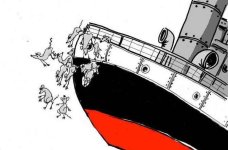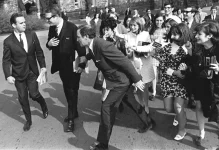Lawrence Martin is one of those pundits for whom the very name Trudeau is sacred. When he says the Justin Trudeau is past his best before date it means that the ships is really ready to keel over and go under.
From today's Globe and Mail:
----------
The Liberals would do better if they replace their dead man walking
Lawrence Martin
LAWRENCE MARTIN PUBLIC AFFAIRS COLUMNIST
SPECIAL TO THE GLOBE AND MAIL
PUBLISHED 1 HOUR AGO
The past isn’t always prologue.
There’s a widespread view that it wouldn’t be beneficial for the Liberals to change leaders at this time; that a new leader would do just as badly, if not worse, in an election than Justin Trudeau; that Liberal Party members are therefore not acting like cowards in not forcing him out.
Look at the precedents, contend those who subscribe to this line of thinking. John Turner succeeded the highly unpopular Pierre Trudeau in 1984 shortly before an election had to be called, and a debacle ensued; the Liberals were reduced to 40 seats. Kim Campbell became Conservative leader in 1993 replacing the much-loathed Brian Mulroney at the end of his second mandate, and an even worse shellacking followed: the Tories were obliterated, winning only two ridings.
But a couple considerations should not be overlooked. The change of leadership in each case did initially provide a major boost in popularity for the parties – so pleased were people to be rid of the incumbents. So much so that Mr. Turner and Ms. Campbell drew even or better with their opponents at some point after their ascension.
The surge, in each case, was short-lived. But small wonder. The campaigns run by Mr. Turner and Ms. Campbell were atrocious, ranking among the most incompetent in Canadian history.
Had they run creditable, strong campaigns, victories still would have been unlikely. But they could have left their parties in far better shape.
No new Liberal leader could be expected to repeat those follies. Odds are that this leader would do considerably better than the Liberals’ dead man walking, who is currently at the helm. The people are more angry at Mr. Trudeau than they are at the party itself. Remove him, and a lot of the animosity exits with him. It will no longer be the Trudeau Party.
A leadership change wouldn’t be like the Democrats’ switch from Joe Biden to Kamala Harris. Mr. Biden was not far behind Donald Trump, nowhere near the distance that separates the Liberals from the Conservatives. But if a new Liberal leader was to perform well like Ms. Harris, a Conservative majority would not be guaranteed.
The country’s economy – inflation has just cooled to two per cent – is not down in the dumps the way it was in 1984 and 1993. The Conservatives have built a huge lead in the polls. But that has more to do with the time-for-a-change drum beating across the land than any great admiration for the party’s nerdy leader, Pierre Poilievre.
The Liberal brand is hurting, but it is not, should Mr. Trudeau leave, under the threat it was in 2011, when the New Democrats took over from the Liberals to become the Official Opposition. That was chiefly owing to the NDP’s dramatic breakthrough in Quebec where they won 59 seats. But its base in the province, owing to the party’s senseless removal of Quebec MP Thomas Mulcair as leader in 2017, is gone, and with it, the chance of ever forming a government.
The Liberals have to turn the page. Senator Percy Downe says it is now too late to make a leadership change because an election could come at any time, and because leadership rules for the Liberals are loose, open to abuse, and need be changed. These are important considerations, but they shouldn’t stop party members from withdrawing their support for Mr. Trudeau and forcing a leadership convention to begin 2025.
Among the potential leadership contenders are three women, Chrystia Freeland, Anita Anand and Mélanie Joly. There is a huge gender gap in this country that shows the Liberals not far behind the Conservatives among women voters. One of the three Liberal women could take advantage of this dynamic.
And of course there’s former bank governor Mark Carney, whose economic expertise and global experience far exceeds that of Mr. Poilievre. The idea that he is not tough enough for politics is nonsense. When he was governor of the Bank of England, he was in the cauldron, subject to intense pressures, media and political attacks.
Mr. Trudeau opened the door for him recently, when he appointed him as the chair of a task force on economic growth. In accepting the position, Mr. Carney showed he is prepared to enter the fray despite the party’s long odds of doing well.
It doesn’t mean he will run in the next election under the Trudeau banner. It means he senses there could be a leadership race. The will of the people has been made clear to Mr. Trudeau: there should be one. The party cannot let him continue to defy it.
----------
Another one abandons ship ....






